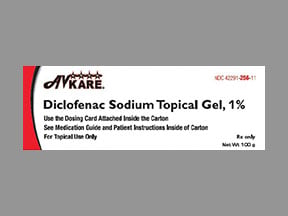
Ft Arthritis Pain Coupons & Savings Card – Discount Prices from $9.65
Brand for: Diclofenac sodium
My prescription
Edit
100GM of 1%, Diclofenac Sodium (1 Tube)
Select pharmacy

Albertsons
$9.65
COUPON PRICE
Walgreens
$10.99
COUPON PRICE
Walmart
$19.56
COUPON PRICEFt Arthritis Pain savings card
Show this card to your pharmacist
Albertsons
$9.65
BIN
ID
PCN
GRP
019876
LH672B3C44
CHIPPO
LHX
Powered by
More prescriptions for rheumatoid arthritis
More prescriptions for rheumatoid arthritis
Price history for Ft Arthritis Pain (brand) & Diclofenac Sodium (generic)
1 Tube, 100GM
Average retail price for Ft Arthritis Pain
Average retail price for Diclofenac Sodium
Average SaveHealth price for Diclofenac Sodium
Our price history data is based on aggregated prescription data collected from participating pharmacies in America. Our prescription data updates daily to reflect the latest price changes. If you notice a missing data point, it means there wasn't sufficient data available to generate a monetary value for that date.
Over the last 12 months, the average discount price of Ft Arthritis Pain is $13.20 using the SaveHealth savings card. That's an average savings of 73.59% on Ft Arthritis Pain with our discount card.
*Retail prices are based on pharmacy claims data, and may not be accurate when we don't have enough claims.
Ft Arthritis Pain (Diclofenac Sodium) dosage forms
Dosage Quantity Price from Per unit 100GM 1 Tube $9.65 $9.65 100GM 2 Tubes $11.80 $5.90 100GM 3 Tubes $13.95 $4.65 100GM 4 Tubes $16.10 $4.03 100GM 5 Tubes $18.26 $3.65
| Dosage | Quantity | Price from | Per unit |
|---|---|---|---|
| 100GM | 1 Tube | $9.65 | $9.65 |
| 100GM | 2 Tubes | $11.80 | $5.90 |
| 100GM | 3 Tubes | $13.95 | $4.65 |
| 100GM | 4 Tubes | $16.10 | $4.03 |
| 100GM | 5 Tubes | $18.26 | $3.65 |
Using the SaveHealth discount card, what is the price of Ft Arthritis Pain without insurance?
Using the SaveHealth discount card, the price of Ft Arthritis Pain without insurance is $9.65.
What is the price of Ft Arthritis Pain at Walgreens?
The price of Ft Arthritis Pain at Walgreens is $10.99.
What is the price of Ft Arthritis Pain at Walmart?
The price of Ft Arthritis Pain at Walmart is $19.56.
